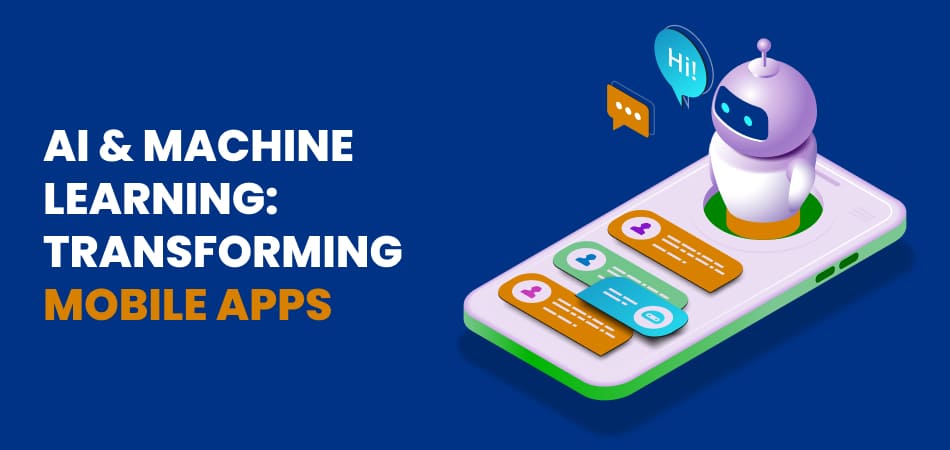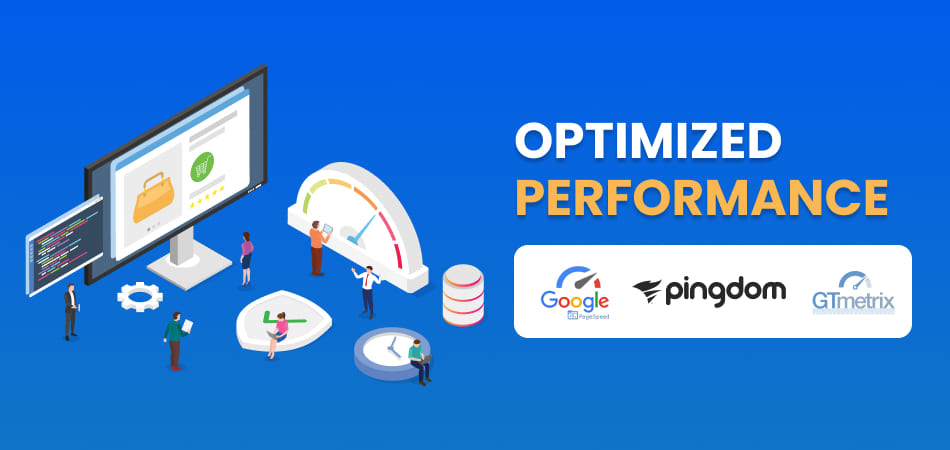The integration of Artificial Intelligence (AI) and Machine Learning (ML) into mobile applications is revolutionizing the way businesses interact with users. From personalized recommendations to advanced security features, AI and ML are enhancing the user experience, automating processes, and boosting app efficiency.
In this blog, we will explore how AI and ML are transforming mobile apps, their key applications, benefits, challenges, and future trends. If you are a business owner or developer considering implementing AI-powered solutions, this guide will help you understand why it is a game-changer.
AI and ML Enhancements in Mobile Apps
AI and ML are designed to mimic human intelligence by processing vast amounts of data and learning from user behavior. These technologies help mobile apps improve decision-making, automate repetitive tasks, and provide predictive insights. Here’s how AI and ML enhance mobile apps:
- Personalized User Experience – AI-driven recommendations tailor content based on user behavior.
- Enhanced Security – Face recognition, biometric authentication, and fraud detection improve app security.
- Efficient Customer Support – AI-powered chatbots provide 24/7 assistance.
- Smart Automation – Apps can automate tasks, reducing manual effort.
- Data-Driven Insights – AI helps businesses understand user behavior and optimize app performance.
- Voice Recognition and Speech Processing – AI enables hands-free control and accessibility features.
- AI in Image Processing – AI enhances photo editing, recognition, and augmented reality features.
- Sentiment Analysis – AI-driven analytics help brands understand user emotions and feedback.
Key Applications of AI and ML in Mobile Apps

1. Personalized User Experience
AI enhances mobile app personalization by analyzing user preferences, browsing history, and real-time interactions to deliver customized content and recommendations.
- Recommendation Engines: Streaming platforms like Netflix and Spotify use AI-powered recommendation engines to suggest movies, TV shows, or music based on user behavior.
- Dynamic UI Adaptation: AI customizes app interfaces based on user interaction patterns, ensuring a seamless experience.
- Behavioral Insights: AI-driven predictive analytics help e-commerce apps like Amazon and Flipkart suggest products based on past purchases and search history.
2. AI-Powered Chatbots and Virtual Assistants
AI-powered chatbots and virtual assistants automate customer interactions, provide instant support, and enhance user engagement in mobile apps.
- Chatbots: AI chatbots like ChatGPT, Drift, and Intercom provide real-time responses, handle FAQs, and automate customer support.
- Virtual Assistants: Assistants like Google Assistant, Siri, and Alexa enable voice-based interactions, setting reminders, scheduling appointments, and providing weather updates.
- NLP (Natural Language Processing): AI enables chatbots to understand and respond to queries with human-like accuracy.
3. AI for Fraud Detection in Banking and Finance Apps
AI strengthens banking security by detecting fraudulent transactions, monitoring real-time activities, and preventing unauthorized access.
- Anomaly Detection: AI detects suspicious transactions by analyzing spending patterns and flagging irregular activities.
- Biometric Authentication: AI-driven face recognition and fingerprint scanning secure banking apps like PayPal and Wells Fargo.
- Behavioral Analysis: AI monitors user behavior, such as typing speed and login locations, to detect fraud.
4. AI-Driven Smart Assistants and Predictive Search
AI-powered smart assistants improve user interactions by predicting search queries, automating tasks, and personalizing app experiences.
- Predictive Search: AI-driven search engines like Google and Bing suggest search terms based on user behavior and history.
- Smart Assistants: AI-powered assistants like Google Assistant and Alexa execute commands and provide contextual recommendations.
- Voice Recognition: AI enables hands-free voice search, making mobile app navigation easier.
5. AI in Social Media and Content Moderation
AI helps social media platforms filter inappropriate content, enhance engagement, and improve ad targeting.
- Content Moderation: AI detects and removes hate speech, violent content, and spam (e.g., Facebook and YouTube AI).
- Personalized Feeds: AI curates news feeds and recommendations on Instagram, TikTok, and Twitter based on user preferences.
- Sentiment Analysis: AI analyzes public opinions on brands, products, and trending topics.
6. AI in Gaming and Adaptive Game Environments
AI enhances gaming by creating intelligent NPCs, adapting difficulty levels, and personalizing gameplay.
- Adaptive Difficulty: AI adjusts game difficulty based on player skill levels.
- Smart NPCs: AI-powered non-playable characters (NPCs) react dynamically to player actions (e.g., GTA and Red Dead Redemption).
- Procedural Content Generation: AI generates new game maps, levels, and storylines to enhance replayability.
7. AI in Navigation and Ride-Sharing Apps
AI optimizes traffic predictions, route planning, and ride-sharing services, making travel more efficient.
- Real-Time Traffic Analysis: Apps like Google Maps and Waze predict congestion and suggest the fastest routes.
- AI in Ride-Sharing: Uber and Lyft use AI to optimize driver-passenger matching, surge pricing, and estimated arrival times.
- Autonomous Navigation: AI-powered self-driving technology enhances safety in vehicles like Tesla Autopilot.
8. AI in E-Commerce and Retail Apps
AI enhances shopping experiences, customer support, and inventory management in mobile retail apps.
- Personalized Product Recommendations: AI suggests relevant products based on browsing history (e.g., Amazon and eBay).
- Visual Search: AI enables users to find products by uploading images (e.g., Google Shopping and Pinterest Lens).
- AI Chatbots: AI-powered chatbots assist customers with product queries and order tracking.
9. AI-Powered Voice & Audio Features
AI is revolutionizing voice and audio processing in mobile apps by enabling real-time speech recognition, personalized voice interactions, and advanced audio enhancements.
- Real-Time AI Voice Assistants
AI-driven voice assistants like Google Assistant, Siri, and Alexa allow users to interact with mobile devices using natural language commands. These assistants can perform tasks such as setting reminders, sending messages, making calls, and controlling smart home devices.
- AI-Powered Noise Cancellation
AI-based noise cancellation enhances call quality by filtering out background noise, echoes, and unwanted disturbances. Apps like Google Meet and Zoom use AI-powered audio filters to ensure clear voice communication in noisy environments. This feature is also used in music streaming apps and podcast platforms to enhance audio clarity.
- Speech-to-Text and Real-Time Transcription
AI-driven speech-to-text technology enables users to convert spoken words into text accurately. This feature is widely used in:
- Voice typing in messaging apps (e.g., Google Gboard, Apple Dictation).
- Transcription services in note-taking apps (e.g., Otter.ai, Microsoft OneNote).
- Live captions for accessibility in video streaming platforms (e.g., YouTube, Netflix).
- Offline speech recognition, where AI enables dictation without an internet connection, improving accessibility and productivity.
- AI-Powered Audio Enhancement for Media Apps
AI-driven audio enhancement is widely used in music and video streaming apps to improve sound quality, adaptive equalization, and immersive audio experiences. Platforms like Spotify and Apple Music use AI to offer personalized sound optimization based on user preferences and listening habits. AI also enables 3D spatial audio and surround sound effects for an enhanced multimedia experience.
10. AI-Powered Camera Enhancements
AI is revolutionizing mobile photography by enhancing image processing, real-time object recognition, and augmented reality (AR) experiences. AI-powered cameras offer a smarter, faster, and more interactive way for users to engage with their devices.
- Real-Time Object Recognition
AI-powered object recognition helps users identify objects, landmarks, and products using their smartphone cameras. Apps like Google Lens and Samsung Bixby Vision allow users to point their cameras at an item to receive instant information, shopping links, and historical facts.
- AI-Based AR Filters & Effects
AI enhances augmented reality (AR) filters, creating interactive and engaging experiences. Social media apps like Snapchat, Instagram, and TikTok use AI-powered AR filters to modify facial features, apply virtual makeup, or add animated effects in real-time.
- AI Smart Scanning
AI-powered document scanning apps, such as Microsoft Office Lens and Adobe Scan, automatically detect, crop, and enhance documents for better readability. AI also powers text extraction (OCR – Optical Character Recognition), allowing users to convert images into editable text instantly.
- Live Language Translation
AI-driven language translation tools enable real-time text translation using a smartphone camera. Apps like Google Translate use AI-powered machine learning algorithms to detect and translate street signs, menus, or printed documents instantly, making international travel and communication easier.
11. AI in Health & Fitness Apps
AI-driven health and fitness apps help users track their physical activity, monitor vital signs, and improve overall well-being through intelligent analysis and real-time feedback.
- Real-Time Pose Detection
AI-powered fitness apps like Nike Training Club and Freeletics use computer vision and machine learning to track body posture and correct exercise form in real time. This ensures users perform workouts correctly, reducing the risk of injury.
- AI-Based Step & Activity Recognition
AI-powered motion sensors in apps like Google Fit and Apple Health can detect walking, running, and cycling activities without requiring external wearables. AI enables smart activity tracking based on movement patterns, ensuring accurate fitness metrics.
- Heart Rate and Stress Detection
AI-powered apps use smartphone cameras and sensors to measure heart rate and stress levels through facial analysis or PPG (photoplethysmography techniques. Apps like Samsung Health and Welltory analyze pulse variations to detect stress and provide personalized relaxation techniques.
- AI-Powered Virtual Health Assistants
AI chatbots in healthcare apps like Ada and Babylon Health provide symptom analysis and health advice based on user input. These virtual assistants help users understand symptoms and suggest whether they should seek medical attention.
Benefits of AI and ML in Mobile App Development
| Benefit | Description |
| Personalization | AI customizes app experiences based on user behavior. |
| Automation | ML automates repetitive tasks, improving efficiency. |
| Enhanced Security | Biometric authentication and fraud detection improve data security. |
| Cost Reduction | AI-powered automation reduces manual labor and operational costs. |
| Real-Time Data Processing | AI analyzes and processes data instantly for better decision-making. |
| Better User Engagement | AI-driven recommendations increase user interaction. |
| Scalability | AI helps scale mobile apps without major infrastructure changes. |
| Improved Decision-Making | AI-driven insights help businesses make data-backed choices. |
| Predictive Maintenance | AI anticipates technical failures and helps businesses avoid downtime. |
| Accessibility Improvements | AI enhances app usability for visually impaired and disabled users. |
Challenges in Implementing AI and ML in Mobile Apps

- High Development Costs – AI-powered apps require advanced algorithms and computing resources.
- Data Privacy Issues – AI relies on user data, raising privacy concerns.
- Complex Integration – Integrating AI with existing systems can be complex.
- Continuous Learning Requirement – AI models need regular updates to remain effective.
- Potential Bias in AI Models – AI predictions can be biased due to incomplete or skewed data.
- Performance Limitations on Mobile Devices – AI processing requires high computational power, which may affect app performance on lower-end devices.
- User Acceptance and Trust – AI needs to build user trust by delivering accurate and unbiased results.
- Regulatory and Ethical Concerns – AI compliance with data protection laws is critical for business credibility.
Future Trends in AI and ML for Mobile Apps
- AI-Powered Edge Computing – AI will process data on mobile devices instead of cloud servers, reducing latency.
- Hyper-Personalization – Apps will provide even more tailored experiences based on AI-driven behavioral analysis.
- Voice and Gesture Recognition – Enhanced voice assistants and gesture-based navigation will improve user interaction.
- AI for AR/VR Applications – AI will enhance Augmented Reality (AR) and Virtual Reality (VR) experiences.
- Automated App Development – AI-driven low-code/no-code platforms will make app development faster and more accessible.
- AI-Powered Cybersecurity – AI will detect and prevent security threats in real-time, protecting mobile users from fraud.
- AI in Emotional Intelligence – AI-powered mobile apps will analyze facial expressions and tone of voice to improve interactions.
Conclusion
AI and machine learning are revolutionizing mobile app development, offering smarter user experiences, enhanced security, and efficient automation. From AI-powered chatbots to predictive analytics and biometric security, businesses leveraging AI can gain a competitive edge in the market.
If you are considering integrating AI into your mobile app, now is the time to act. By leveraging personalized recommendations, automation, and security features, businesses can ensure better user engagement, higher retention rates, and increased revenue.
The future of mobile apps is AI-driven—are you ready to embrace the change?



